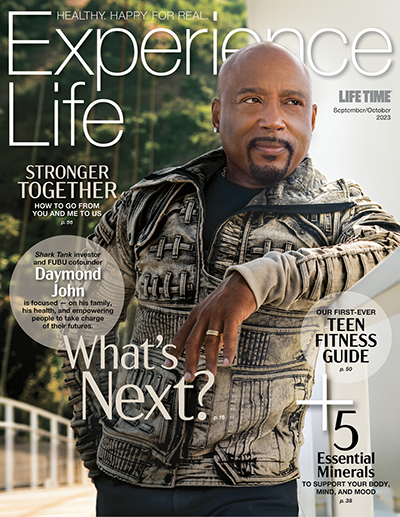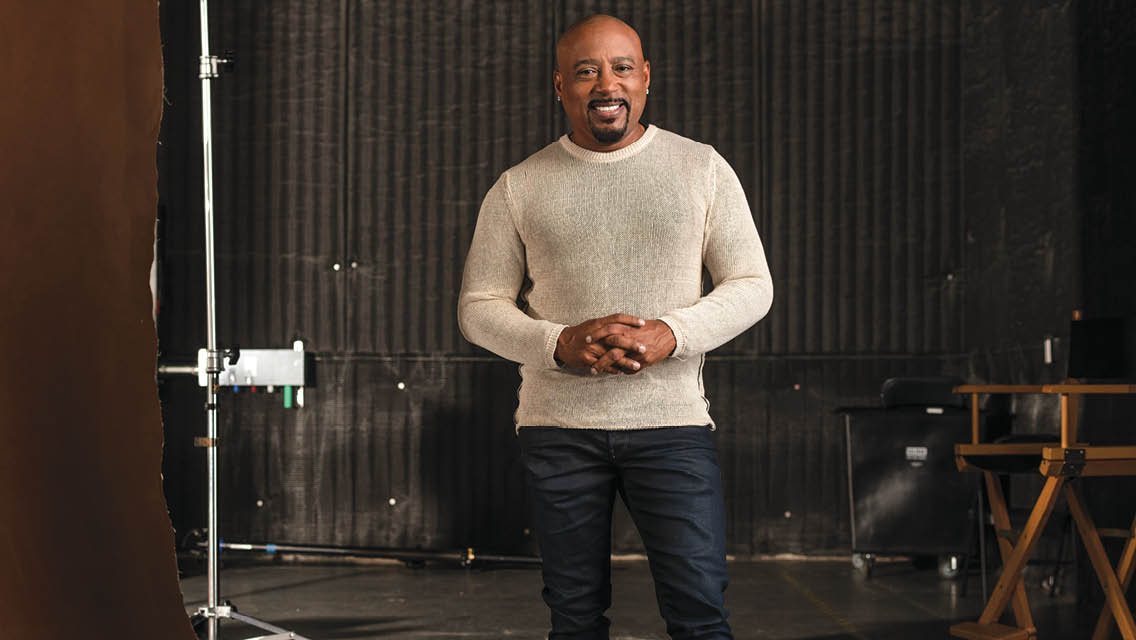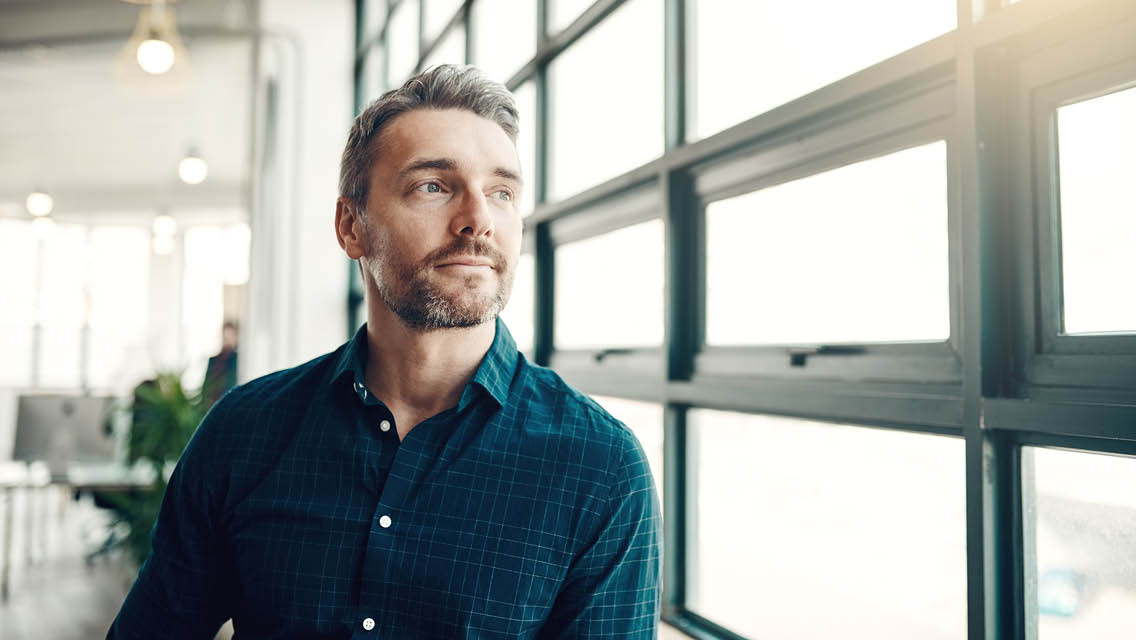Daymond John lives a larger-than-life life.
Well known as an investor shark on ABC’s Shark Tank reality business show, John is also CEO of a brand agency, The Shark Group, as well as founder and CEO of the streetwear brand FUBU. He’s a motivational speaker and mentors fledgling entrepreneurs. He’s also written several books on entrepreneurship — plus a new book to teach kids financial literacy.
He lives a tightly scheduled, coast-to-coast lifestyle that will make you tired just thinking about it.
But the decisions John makes and the pace he keeps are deeply aligned with who he is: one part visionary — always looking ahead — and one part pragmatist.
As a teen growing up in the Queens borough of New York City in the 1980s, John saw the path many of his peers were taking: selling drugs. He stepped back and did the math.
 “What would they make a year? Maybe $50,000?” he says. “Now let’s talk about the fact that they’re going to spend some time in jail. That’s a lot of lost income plus, say, $100,000 in lawyer fees.”
“What would they make a year? Maybe $50,000?” he says. “Now let’s talk about the fact that they’re going to spend some time in jail. That’s a lot of lost income plus, say, $100,000 in lawyer fees.”
John decided it was far better — “common sense,” he says — to work a job (in his case, at Red Lobster) while creating something of his own. He cofounded FUBU’s clothing line out of his mom’s house in the early 1990s, gradually catching the attention of high-profile hip-hop artists, retailers, and investors. He ultimately grew the startup into a $6 billion company.
Then, in 2017, the 48-year-old tycoon was diagnosed with stage II thyroid cancer, which prompted him to think differently about his approach to health. We asked him what he’s learned about overcoming challenges, taking risks, and approaching his goals with longevity and legacy in mind.
Experience Life | In the early days of FUBU, you experienced lots of setbacks. What was your self-talk then, and how do you talk yourself through challenges now?
Daymond John | I’d ask myself, What did I do wrong? Even now, I start there. Then I drill down: Why did something not work? If it didn’t work and I can’t fix it, I ask, Do I have the right people around me to fix it? Why exactly am I doing this?
Some people say we should learn from the mistakes of others, rather than make our own. But we all make mistakes. So, you turn around and ask, What did I learn from this? Now, do I take away 100 percent of the lessons I’ve learned? No. I still make some of the same mistakes. Are they the big ones, though? No.
EL | Entrepreneurs are risk-takers. What kinds of risks are you drawn to in business and in life?
DJ | There’s no difference between business and personal, business and time, business and relationship, business and health. Every one of these has a positive inventory or they’re running in the negative. Every one of these has a short outcome and a long outcome. Every one of these needs several players, and every one of these revolves around the availability of time, assets, access, and resources.
I’m drawn to affordable risks, things that I can recover from, things that are decently thought out. I’ll never get mad at myself for having too much trust in a person, but I don’t take massive risks.
EL | How do you set goals for yourself?
DJ | I always have 10 goals — broken down into health, family, faith, and business, and they all have expiration dates. Six expire in six months. One expires in two years, one in five years, one in 10 years, and one in 20 years. They’re typed up in my phone and I read them every night before I go to sleep and every morning when I wake up.
I also have a playlist that I listen to while I read my goals. It’s got 300 songs, including Bill Conti’s “Going the Distance” from Rocky, the theme from The Terminator, and the theme from Chariots of Fire.
But before I do that, I close my eyes and envision myself surrounded by all the people I love, including my family and my friends, and give thanks to all the things that exist in my life. Then when I come to my goals, I’m already feeling blessed and fortunate.
EL | How have your health goals changed since your cancer diagnosis?
DJ | I’ve always had a health goal. A goal I used to have was to get to 175 pounds and fit back into my Shark Tank suit from season 1.
I didn’t hit that goal for six years. Now, I had had a couple of hurdles. I got cancer. I got married. I had a new baby. My life got extremely busy with travel.
But why didn’t I hit that goal? It was because I didn’t have a substantial enough goal. When I started to envision something bigger than fitting into my Shark Tank suit — when I started to say, I want to live longer, never have cancer again, and walk my girls down the aisle, suddenly I was able to drop 40 pounds.
EL | You do a lot of health practices — some that are next-level and not yet mainstream. What does your self-care look like?
DJ | I get a colonoscopy and endoscopy every two years. I get an executive physical every two or three years. I do nutritional IV drips and lie in a red-light bed. I have a lymphatic drainage machine and a PEMF (pulsed electromagnetic field) mat. I take oxygen and test my DNA. I drink green juice two times a day. I’m going to get an EBOO (extracorporeal blood oxygenation and ozonation therapy) machine to help remove the heavy metals from my body.
EL | Healthy habits take practice. Are there any you struggle with?
DJ | I still drink too many energy drinks. Now, what is my rationale for that? I don’t have one — it’s a vice I have that I will focus on eventually. That “eventually” is probably going to be when my current set of goals expires. The new set will include consuming 50 percent less of my current caffeine intake. Will I fail? Maybe. Will I go cold turkey? No.
EL | What’s next for you?
DJ | I want to transform the lack of financial education in our schools. Why do kids become drug dealers? They don’t think they have any prospects. Why are people often unhealthy? Because if they don’t have money, they’re going to grab something quick and cheap and usually unhealthy. There are so many ailments that come down to lack of money, and we were never taught this in school.
I have a new book out called Little Daymond Learns to Earn. But I’m just one person. I need to get other people excited so we can break this system so we can become a country of owners instead of renters.
On the Cover
For more intimate, thought-provoking profiles of our inspiring and influential Experience Life cover subjects, visit our On the Cover department.
This article originally appeared as “Uncommon Sense” in the September/October 2023 issue of Experience Life.





This Post Has 0 Comments